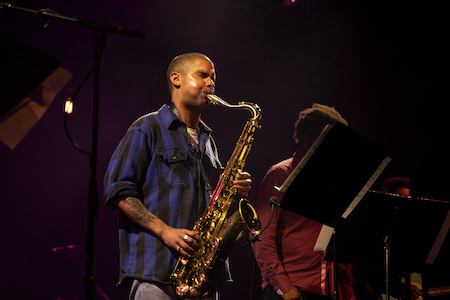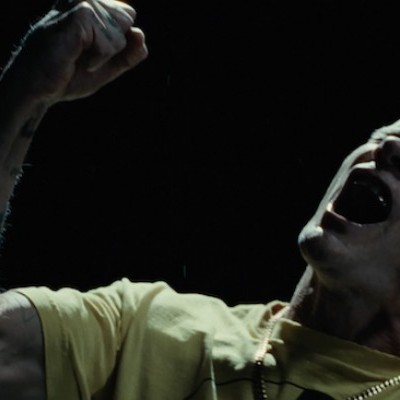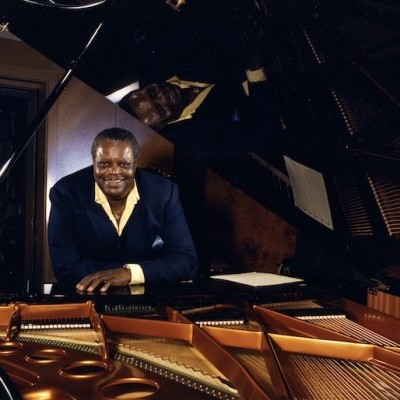Dec 9, 2025 12:28 PM
In Memoriam: Gordon Goodwin, 1954–2025
Gordon Goodwin, an award-winning saxophonist, pianist, bandleader, composer and arranger, died Dec. 8 in Los Angeles.…

Tenor saxophonist Binker Golding produced an unexpected new sound with some of London’s finest young players.
(Photo: Tatiana Gorolovsky)Over the past 30 years, U.K. jazz has taken on multiple, ever-changing guises. From the genre-spanning fusions of the group Polar Bear, to the sound system interpolations of Jazz Warriors, the dance-floor focus of Acid Jazz and Jason Yarde’s saxophone experimentalism, British improvised music has been gradually and often quietly carving out a niche of its own.
For the past three decades, the London Jazz Festival has been documenting this change with its annual 10-day programs across the English capital. With its debut lineup featuring the likes of South African pianist Abdullah Ibrahim alongside British big band leader Jools Holland and drummer Louis Moholo, ensuing installments have focused on the music of diverse generations of young British instrumentalists. Specifically over the past five years, the festival has become a showcase of a new iteration of improvised music that references the diasporic cultures of its players, blending West African rhythms, highlife melodies and jazz instrumentation. Key performances have come from the likes of saxophonists Shabaka Hutchings and Nubya Garcia and drummer Moses Boyd.
It is a popular pursuit, as the majority of the shows for the 30th anniversary edition of the festival, held Nov. 11–20, were sold out. Opening proceedings to a packed room at the Southbank Centre was a highlight of the week: London-based tenor saxophonist Binker Golding. Coming to prominence alongside Boyd with their free-jazz duo Binker and Moses, Golding has developed a hard-blowing, dextrous sound that weaves through emphatic melodies. Taking to the stage with a crop of some of the capital’s finest young players — Daniel Casimir on bass, Alice Zawadski on vocals and violin, Sam Jones on drums and Sarah Tandy on piano — Golding produced an unexpected new sound, supplanting the frenetic swing of his 2019 debut album with artful versions of everything from Carole King compositions to Americana, bluegrass and gospel.
Performing without drums or piano for the first half of the set, Golding blended a newly softened tone beautifully with the voicings of harmonica virtuoso Philip Achille, playing through a deft rearrangement of The Smashing Pumpkins’ ballad “To Sheila” and King’s “Way Over Yonder.” Zawadski’s tender vocals were a high point throughout, soaring on an emotive take of the gospel standard “I’ll Fly Away,” as well as providing a touching, hopeful rendition of “I Shall Be Released.”
Golding’s 90-minute set was one of warmth and optimism, an interpretation of music forged in the struggle of the American experience, recast through new ears and voices. It is a reinterpretation that ultimately ends with the catharsis of a foot-stomping hoedown, finding unity in the earthy groove of Golding’s composition “(Take Me To) The Wide Open Lows,, while Tandy ran through a fast-paced, passionate solo and the band yelped their approval.
The imaginative landscapes of America might have provided the inspiration for Golding’s performance, but across town in Kings Place, it is the freneticism of city living that gave vitality to pianist Bill Laurance’s solo show. A founding member of fusion supergroup Snarky Puppy, Laurance’s recent output has managed to transpose complex, multi-instrumental arrangements all onto the keyboard. With the rhythm section in his left hand and the horns and vocals in his right, Laurance’s performance is a master class in world-building through cinematic melodies.
Playing through tracks from his latest release, Affinity, Laurance looked to the ceiling as he felt his way around the Steinway, producing gorgeously melismatic runs on “Everything Exists” before probing the melancholy introspection of the album’s title track. He extended each composition into new territory, interweaving lines of samba and clave rhythm or crossed-hands bass cacophony, as if giving voice to the hectic interruptions of crowded urban existence among the beauty of his harmonies.
This tension between beauty and dissonance reached its apex during Laurance’s performance of the title track from his 2019 album Cables. Backed by a looping arpeggiated synth, he produced a metallic, futuristic palette from his acoustic piano, playing with intense physicality through the changes and building to a melodramatic crescendo that ultimately left the audience in stunned silence as the final notes rang out.
Golding and Laurance’s disparate performances existing on the same bill is testament to the admirable variety on display at the 2022 edition of the festival. Alongside international greats such as Abdullah Ibrahim and MoodSwing, there was a heady showcase of jazz dance from DJs such as Bonobo and Tenderlonious at the nightclub Printworks, while the youthful British contingent continued to flourish with a punchy performance from saxophonist Camilla George. Ultimately, this year’s festival proclaimed that U.K. jazz players and its audiences are still in rude health and hungry for new means and methods of expression. May it continue for another 30 years — and onwards. DB

Goodwin was one of the most acclaimed, successful and influential jazz musicians of his generation.
Dec 9, 2025 12:28 PM
Gordon Goodwin, an award-winning saxophonist, pianist, bandleader, composer and arranger, died Dec. 8 in Los Angeles.…

Flea has returned to his first instrument — the trumpet — and assembled a dream band of jazz musicians to record a new album.
Dec 2, 2025 2:01 AM
After a nearly five-decade career as one of his generation’s defining rock bassists, Flea has returned to his first…

Belá Fleck during an interview with Fredrika Whitfield on CNN.
Jan 13, 2026 2:09 PM
The fallout from the renaming of the John F. Kennedy Center for the Performing Arts to include President Donald…

“It’s a pleasure and an honor to interpret the music of Oscar Peterson in his native city,” said Jim Doxas in regard to celebrating the Canadian legend. “He traveled the world, but never forgot Montreal.”
Nov 18, 2025 12:16 PM
In the pantheon of jazz luminaries, few shine as brightly, or swing as hard, as Oscar Peterson. A century ago, a…

Dec 11, 2025 11:00 AM
DownBeat presents a complete list of the 4-, 4½- and 5-star albums from 2025 in one convenient package. It’s a great…